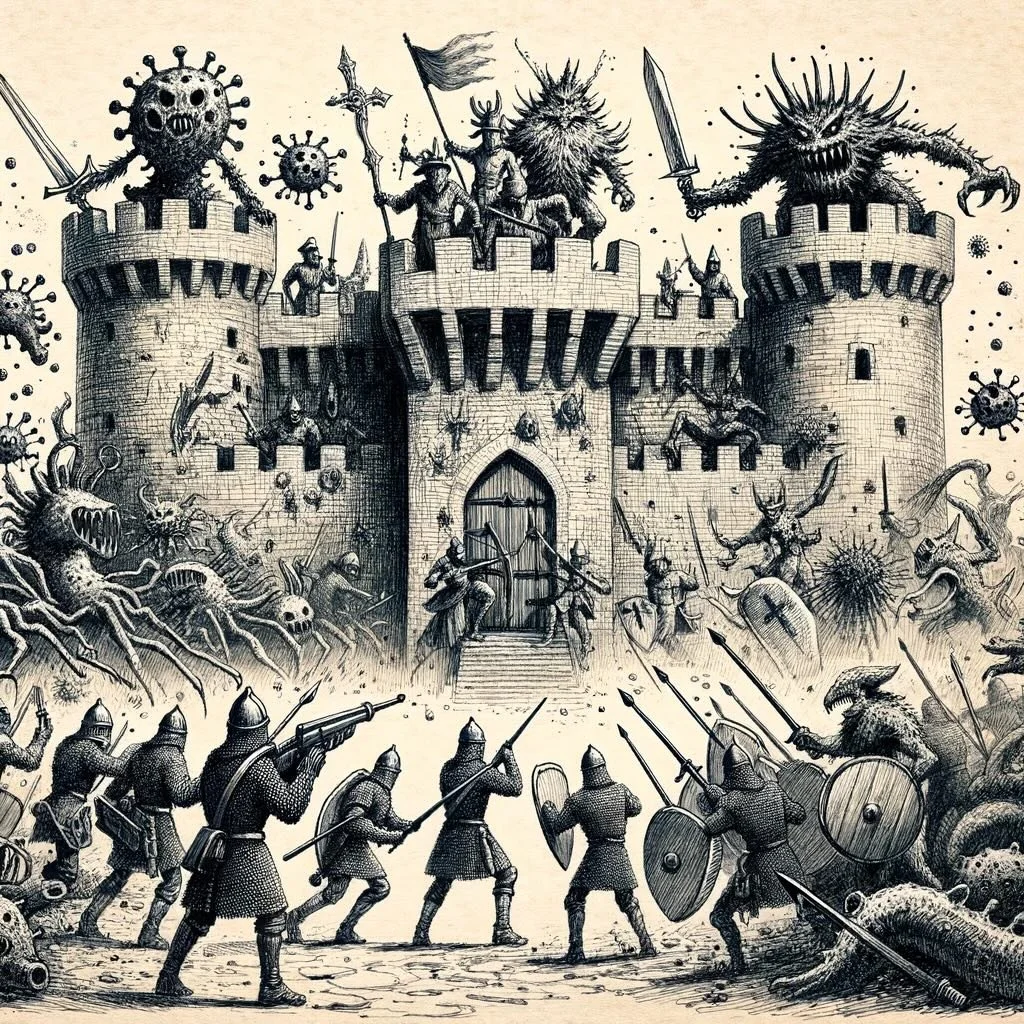Your Body's Defenses: The Secrets of Immunity & Effects of Smoking
As a healthcare professional, I've seen firsthand the devastating effects of smoking on my patients' health. While everyone knows it's harmful, quitting can be incredibly difficult. Rather than just telling someone something is bad and they should quit I think providing research and an explanation of the “why” is a better approach. So when I stumbled upon new research about the effects of smoking on the immune system I couldn't wait to try and further expand on the, “why.”
So, whether you're a smoker considering quitting or simply curious about the science behind the risks, join me as we delve into the latest research on how smoking impacts your body's defenses. Let's explore the "why" behind the "don't smoke" message so you can make informed choices about your health.
A Step Into Medieval Immunity
Imagine your body as a bustling medieval castle, constantly under siege by invaders – germs and pathogens seeking to wreak havoc. But fear not, for you have a valiant army at your disposal: your immune system! This intricate network of cells and molecules acts as your tireless defenders, keeping you healthy and strong.
Within this army, two distinct groups stand guard: the innate soldiers, your castle walls ever vigilant against immediate threats, and the adaptive soldiers, your trained knights who learn to recognize and target specific foes. Just like the quality of your castle walls and the training of your knights, factors like age, sex, and even genetics play a role in the strength and efficiency of this army.
But what happens when a dark cloud, in the form of smoking, hangs over your castle? This is where a fascinating new study comes in, shedding light on how smoking disrupts your immune system, weakening its defenses and leaving you more vulnerable.
Smoking's Mustard Gas Attack:
The study reveals that smoking acts like a devastating mustard gas attack on your immune system, impacting both innate and adaptive responses. In the short term, it throws your innate soldiers into disarray. Like knights blinded by the gas, they become hyperactive, firing their alarm signals (cytokines) indiscriminately, not necessarily targeting the enemy effectively. Meanwhile, the adaptive soldiers suffer long-term damage to their DNA instructions, their ability to recognize and fight specific invaders is significantly hampered.
Beyond Soldiers: Plasma Proteins and DNA Methylation:
But the story doesn't end with immune cells. Smoking also disrupts the communication channels within your army. The study identifies a specific protein, CEACAM6, which acts like the signal flags used by knights. Smoking disrupts the levels of this protein, hindering communication and coordination among your immune cells.
The most intriguing finding, however, lies in the realm of DNA. Smoking seems to leave a lasting "mark" on the DNA of certain immune cells, particularly B and T cells. This "rewriting" of instructions affects how they communicate and fight infections, explaining why the effect of smoking lingers even after quitting. It's like the enemy infiltrating your castle armory and subtly tampering with the knights' weapons, making them less effective in the long run.
The Call to Arms: Continued Research is Vital:
Understanding how smoking's "mustard gas" affects the intricate dance of immune cells, plasma proteins, and DNA methylation is crucial. While quitting smoking is always the best course of action, akin to evacuating your castle and seeking fresh air, it takes time for your immune system to recover from the damage. More research is needed to fully unravel the mechanisms behind the increased mortality rate of smokers and develop targeted interventions to support their immune system recovery, but this latest research is another good step in learning more about how smoking effects specific aspects of our immune system
So, remember, your immune system is a complex army under constant threat. Smoking acts like a chemical weapon, directly harming your soldiers and weakening their defenses. By understanding its impact, we can better protect our health and appreciate the importance of a smoke-free lifestyle. Stay tuned for further updates as science continues to unveil the secrets of immunity and how to keep our inner armies strong!
As always I hope you enjoyed this blog and feel free to reach out to me at drcoffman@optimizecolumbus.com with any questions.
Reference
Saint-André V, Charbit B, Biton A, Rouilly V, Possémé C, Bertrand A, Rotival M, Bergstedt J, Patin E, Albert ML, Quintana-Murci L, Duffy D; Milieu Intérieur Consortium. Smoking changes adaptive immunity with persistent effects. Nature. 2024 Feb 14. doi: 10.1038/s41586-023-06968-8. Epub ahead of print. PMID: 38355791.
